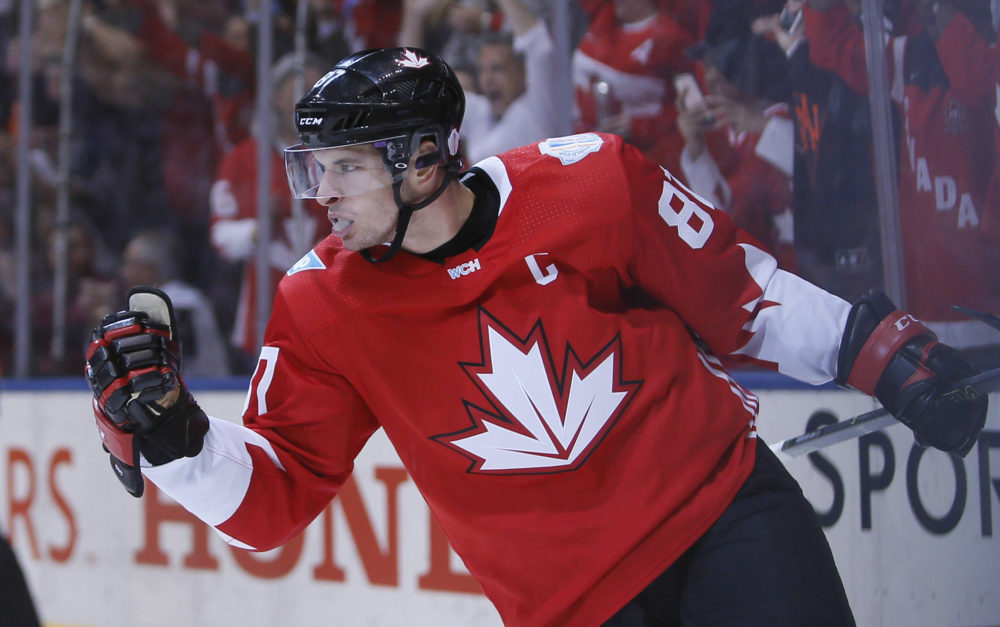Sidney Crosby has won just about everything you can in hockey. Since entering the league in 2005-06, he’s won three Stanley Cups, two Conn Smythes, two Art Ross trophies, two Hart Trophies, three Ted Lindsays and two Rocket Richards. He’s recorded 411 goals, 705 assists and 1,116 points in 864 career games — only Alex Ovechkin has more points (1,122) since 2005-06.
Crosby also secured a spot on the NHL’s top 100 players of all time list back in January of 2017. He could retire tomorrow and still be a first ballot Hall of Famer. There’s not much left for Crosby to accomplish at the game’s highest level, although it doesn’t mean he’s finished solidifying himself as one of the best ever.

Crosby reached the 1,000 career point mark against the Winnipeg Jets on Feb. 16, 2017, with an assist on Chris Kunitz’ first-period goal. In doing so, he achieved the milestone in his 757th career game, 12th fewest in league history. With the first thousand down, people started to wonder, could somebody other than Gretzky reach the 2,000 point mark? Will Crosby be the one? It’s a number even all-time greats like Jaromir Jagr, Mario Lemieux, Mark Messier, Steve Yzerman and Gordie Howe have fallen short of. But with the longevity of his dominance, it’s not out of the question.
While Crosby won’t reach Wayne Gretzky’s all-time record of 2,857 career points, it’s not out of the question that he could become only the second player in NHL history to crack the 2,000 point plateau. Crosby also has a shot at reaching the top 10 in career points. Although he faces an uphill battle if he’s going to reach these historic marks.
Creating His Path to 2,000 Points
Entering the 2018-19 season, Crosby sits at 1,116 career points, 884 short of 2,000. He’s also 61st all-time in scoring. It’s not going to be easy, but for someone like Crosby, it’s not impossible either.

If Crosby only plays until his contract expires at the conclusion of the 2024-25 season when he’ll be 37, he’d need to average 127 points a season. This isn’t happening, regardless of how good he is. Although Crosby has said in the past, he plans to play for a long time, and “age is just a number.” So it’s likely he’s going to play past the next seven seasons and this will help his chances of reaching 2,000.
Crosby discussing his plan to play a long, competitive career on @MikeAndMike. He cites Cullen still playing at 40. "Age is just a number."
— Pittsburgh Penguins (@penguins) May 12, 2017
For his career, Crosby averages 1.292 points per game (P/G), a number which is sixth best in NHL history. Over an 82 game season that adds to 105 points. So if Crosby plays another 684 games at his career average, he would reach the 2,000 point milestone about a quarter of the way through the 2027-28 season. In this assumption, though, there are a number of factors being ignored. These include things like age and injury impacting his play, and expecting eight straight 100 point seasons from a player who hasn’t reached the century mark since 2013-14. Therefore, we’re going to be more conservative when it comes to creating Crosby’s path.
Since the beginning of the 2015-16 season, Crosby has recorded 263 points in 237 games (1.11 P/G), a 91 point pace over a full season. It’s more realistic to expect this kind of production from Crosby through the remainder of his career than the nearly 1.3 P/G pace he currently holds, although his eventual decline in play has to be taken into account.

The following numbers are based on Crosby playing a full 82 game season.
Say Crosby maintains a 91 point pace from 2018-19 through 2020-21, he’ll record 273 points over that time, leaving him 611 points short. If his point total drops to 85 in 2021-22 and 80 in 2022-23, he’ll record 165 points over that time. Giving Crosby 1,554 for his career and leaving him 446 short of 2,000.
In 2023-24 and 2024-25, let’s say he records 75 and 70 points, respectively. This would give Crosby 1,699 career points. While he’d be 301 back of 2,000, he would move up to ninth all-time in NHL scoring. This is also the year Crosby’s contract expires. Although he’s made, it clear he wants to play for a long time and cited his teammate, Matt Cullen who’s 41, as to why he can continue to play and be productive.
So, let’s say he plays until 42 as Cullen has. Crosby would need to average 60 points a season from 2025-26 to 2029-30 to reach 2,000 points. Here’s how he could become the second player in league history to achieve the milestone.
- 2025-26: 70 points- would pass Lemieux as the highest scoring Penguin of all-time.
- 2026-27: 65 points- would enter the top five in all-time scoring
- 2027-28: 60 points- would enter top three in all-time scoring
- 2028-29: 55 points- would pass Jaromir Jagr for second in all-time scoring
- 2029-30: 55 points- would surpass 2,000 career points

Crosby would have 2,004 points at the conclusion of the 2029-30 season when he’ll be 42-years-old. He’ll have recorded 888 points in 984 games (.92 P/G) over 12 seasons to reach the milestone and be in his 25th NHL season total. Altogether, Crosby would have 2,004 points in 1,848 games (1.08 P/G). The games played would set a record as well.
Of course, this is all pending he stays healthy over the next 12 years and doesn’t change his mind on playing for a long time.
What’s Working in His Favor
What may be working in Crosby’s favor most if he’s going to reach 2,000 points is his talent level. He’s arguably a top-five player of all time based on talent, and those kinds of players don’t grow on trees. He’ll likely have another four or five seasons of elite play before he sees any kind of noticeable drop-off. Crosby doesn’t rely on speed as much as others, which tends to be one of the first things to go. Most of his game depends on his strength and vision, both attributes tend to last longer. Even when Crosby’s play does start declining, he’ll likely become more of low 70’s point player than a 50 point one.
Before we get too far ahead of ourselves, it’s likely Crosby still has a couple more 90 point seasons left in him. If he can reach that number, it should help offset the drop off he’ll eventually see.
It also helps that Crosby can play with almost anybody. From Ryan Malone to Chris Kunitz to Conor Sheary, Crosby has always shown he doesn’t need elite talent around him to put up big numbers. He makes everybody around him better, and it could pay off as he gets older and the Penguins start to experience a rebuilding phase. This could allow Crosby to remain productive with whomever the team throws beside him in those years.

Even though he’s no longer “Sid the Kid,” Crosby remains among the most productive players in the league at 31-years-old. He’s never finished with less than a point per game (P/G) over his 13-year career and has only failed to finish in the top ten in P/G twice. He didn’t qualify in 2011-12 because of injury, although his mark of 1.68 would’ve placed him first. The second time was last season, where his 1.09 P/G ranked him 13th. Here’s how Crosby has ranked over his career in P/G.
- 2005-06: 102 points in 81 games (1.26 P/G, 6th)
- 2006-07: 120 points in 79 games (1.52 P/G, 1st, Art Ross)
- 2007-08: 72 points in 53 games (1.36 P/G, 2nd)
- 2008-09: 103 points in 77 games (1.34 P/G, 3rd)
- 2009-10: 109 points in 81 games (1.35 P/G, 4th, Rocket Richard)
- 2010-11: 66 points in 41 games (1.61 P/G, 1st)
- 2011-12: 37 points in 22 games (1.68 P/G, DNQ)
- 2012-13: 56 points in 36 games (1.56 P/G, 1st)
- 2013-14: 104 points in 80 games (1.30 P/G, 1st, Art Ross)
- 2014-15: 84 points in 77 games (1.09 P/G. 1st)
- 2015-16: 85 points in 80 games (1.06 P/G, 3rd)
- 2016-17: 89 points in 75 games (1.19 P/G, 2nd, Rocket Richard)
- 2017-18: 89 points in 82 games (1.09 P/G, 13th)
Its obvious age isn’t stopping him from putting up the numbers he’ll need in his chase for 2,000. Is Crosby going to average a point a game every season until he retires? Probably not. Not even Jagr, who’s second place in all-time scoring and averaged a point a game after turning 35-years-old. This doesn’t mean Crosby’s going to instantly stop being productive once he hits 35 — it just means longevity will become more of a factor for him.
What’s Working Against Him
Now come the negative factors. Crosby has a long and concerning injury history. He played just 23 games from Jan. 1, 2011 until the end of the 2011-12, because of two separate concussions. He then suffered two more during the 2016-17 regular season and playoffs, giving him four for his career. He dealt with a high ankle sprain in 2007-08 and a broken jaw in 2012-13 as well. Over the last five seasons, Crosby seems to have shaken the durability concerns, playing 394 of 410 total games, though his early career injuries may prove to be too much for him to overcome.

For his career, Crosby has missed 168 games (over two full seasons), causing him to lose a lot of points and awards. Back in April, THW’s Kyle Gipe wrote about 2017-18 being the first 82 game season of Crosby’s career. Additionally, he did the math on how many points his injuries have cost him over the years.
Using individual season projections, Crosby would have 496 goals and 1,376 points in 1,032 games, raising his career scoring rate from 1.29 P/GP to 1.33 P/GP. Given his high scoring rates from 2010-11 to 2012-13, the largest additions to his career scoring totals would have happened during those seasons.
Crosby lost a majority of his time due to injuries from ages 20-25, a time where players are at the height of their abilities and productivity. That isn’t to say Crosby isn’t a productive player anymore — he clearly is — but he’s likely never going to produce at a scoring title-winning level again, and the facts support it. Since 1998, only two players age 30 or over have won the Art Ross Trophy –Daniel Sedin in 2010-11 and Martin St. Louis in 2012-13.
No matter how good a player is, injuries can derail historic achievements. Lemieux, now the Penguins owner is a perfect example. Throughout his career, Lemieux suffered a number of injuries, even suffering from cancer in 1993. He finished with 1,723 points in 915 games (1.883 P/G, 2nd all time), while playing just 66.2 percent of potential games in his career. Had Lemieux played in all 1,382 games he was eligible for, he would have recorded 1,024 goals (first all time) and 2,602 points (second all-time).
While Crosby wasn’t going to reach Lemieux’s level of production because of the way the game has changed, he is looking at the same fate as Lemieux. An all-time great whose production is limited by injuries.

Another factor working against Crosby is the number of lockouts the NHL gets itself in to. In 2012-13, he lost half of a season because of a lockout, and as THW’s Wolfram Ott wrote back in July, the players are planning for a work stoppage once again in 2020-21.
Even more foreboding was the recent failed attempt to extend the current CBA. The league made an offer to allow players to participate in the Olympics in South Korea, in exchange for extending the current CBA by three years. The NHLPA rejected the offer due to a variety of concerns about the current deal, not the least of which is the mandated escrow payments by the players. This may seem trivial, it may also serve as the canary in the coal mine that points to trouble ahead.
While the 2012 lockout may have benefited a 25-year-old Crosby, allowing him more time to get over his concussions, it’s unlikely a lockout at 33-years-old would have a similar impact. Players athletic abilities don’t tend to improve as they get older, so any more wasted time could put a dagger in his quest to 2,000 points.
Ultimately, Crosby faces a tough challenge if he’s going to join Gretzky as a member of the 2,000 point club. He has a much better chance of becoming a top 10 scorer all time, as he sits 445 points back of overtaking Phil Esposito (1,590) for 10th place. However, just when you think you’ve seen it all from Crosby, he goes out and does something you can’t believe, so 2,000 points for him can’t be written off just yet.